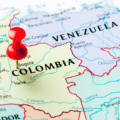Navigating the legal maze of remote work in Colombia can feel overwhelming. Trust me, deciphering those intricate laws isn’t my idea of a good time either. But with the introduction of Law 2121 in 2021, there’s been a significant shift for us remote workers.
This article is here to break down these changes and shed light on what they mean for you. Let’s dive into this together and find some clarity!
Key Takeaways
- Colombia has laws for remote work like Law 2088 of 2021, which requires agreements between employers and employees about home or coworking spaces.
- Companies in Colombia must provide equipment and cover some expenses for people working remotely.
- Workers can ask their bosses to let them work from places outside the office. This needs to be agreed on by both sides.
- If you work from home in Colombia, your boss has to make sure your place is safe. You also need health insurance that meets government standards.
- There are special visas for people from other countries who want to work remotely in Colombia, including a visa for digital nomads.
Understanding Remote Working Legislation in Colombia

Medellin, Colombia
Colombia has laws for remote work that companies and workers must follow. These include Law 2088 of 2021, which sets rules on working from home, the equipment needed, and health standards.
Fundamental laws and regulations
Law 2088 of 2021 is a game-changer for remote work in Colombia. It says that working from home or a coworking space can happen if both sides agree. This law covers everyone, no matter if they work for the government or a private company.
The rules also say that sometimes, people can work from different places but not all the time.
This law names several ways to work remotely, like telecommuting more than twice a week. To make sure everything’s clear and fair, it lists what bosses and workers must do and follow.
For example, they need to talk about how often someone will come into an office or if they’ll just meet online. Plus, there are special tips about taxes for folks working in another state or country.
Employer and employee obligations
Moving from the basic laws and rules, we now focus on what bosses and workers must do. Bosses need to chat with their teams about working away from the office, as Law 2121 says. They must make sure everyone agrees.
This means writing down how things will work, like hours and tasks. For people working remotely in Colombia or anywhere else, knowing these details is key.
Bosses also have to look after their team’s well-being when they’re not in the office. They should give tools for the home office and cover some costs of working from there. Safety at the makeshift desk is a boss’s job too; they might even offer insurance for health or accidents while clocking in from afar.
Workers aren’t left out; they should know their rights, like asking to telecommute or having safe work conditions at home.
Navigating the Implementation of Remote Work
Introducing remote work into a company involves clear plans and tools. Employers must decide on the right to ask workers to work from home, while employees can also put forward their wish for home-based work.
Incorporating remote work in a company
I’m diving deep into how companies can weave remote working into their fabric. Given the Remote Work Law in Colombia, it’s crucial for both sides to understand the drill.
- Draft clear policies on work from home arrangements. These should cover work hours, communication methods, and productivity measurement.
- Set up digital tools for collaboration and communication. Think about using project management software and video conferencing apps.
- Equip employees with necessary technology and Internet access. This may mean providing computers, software subscriptions, and a stipend for high-speed Internet.
- Train staff on digital security practices to protect company data. Regular updates on password management and secure file sharing are essential.
- Offer resources for setting up ergonomic home offices. This could be advice on proper chair height or allowances for desk purchases.
- Implement regular check – ins to support team morale and mental health. Weekly video calls can help keep everyone connected.
- Adjust HR policies to reflect the new remote work environment. This includes revising performance review methods.
- Educate managers on leading remote teams effectively. Skills in virtual leadership can make a big difference in team dynamics.
- Ensure compliance with labor laws regarding work hours and overtime pay for remote employees.
- Promote a healthy balance between work and home life to prevent burnout among staff members.
By taking these steps, companies can smoothly transition to incorporating remote working into their operations while keeping an eye on legalities and employee well-being.
Employer’s right to mandate remote work
After deciding how to fit remote work into a company, it’s critical to understand the rights of employers. In Colombia, bosses can ask workers to switch to working from their homes or any other remote location.
This decision should follow legal guidelines and respect employee agreements.
Here’s the deal: if a boss decides that jobs need to be done remotely, they must communicate this clearly and make sure every worker has what they need. This includes proper tools like computers and internet access.
The goal is simple: keep everyone on the same page while making sure work gets done effectively from afar.
Employee’s rights to request remote work
Shifting from the topic of an employer’s power to set remote work, let’s talk about what rights employees have in this setup. In Colombia, workers can ask to work remotely. This must be a mutual decision between them and their bosses.
The labor laws in this country include different kinds of away-from-office work like telecommuting for those who are not at the office more than two days weekly.
If you prefer typing at your kitchen table rather than commuting every day, you’re in luck. You can propose remote work to your boss. Remember, your job details should stay the same even when you switch to working from afar.
This means your hours, tasks, and how much you get paid remain unchanged. It’s all about finding a balance that suits both sides – making sure company goals are met while enjoying the freedom of selecting where to complete your tasks.
Financial Aspects of Remote Work in Colombia
Remote work in Colombia brings new costs for companies and workers. Companies must provide equipment and pay for some home office expenses. Workers might get extra money for working from home.
Provision of office equipment and supplies
Let me tell you, the new remote work rules in Colombia make a big difference for people like us. Now, companies must give remote workers the tools they need to work from home. Here’s what this means for digital nomads and remote workers:
- Companies need to provide essential tech gadgets. This includes computers, printers, and reliable internet access. You won’t have to worry about your connection dropping during an important meeting.
- Office supplies come next. Think of items like paper, pens, and notebooks that you use daily. Employers should send these your way so you can stay organized.
- Ergonomic furniture is part of the deal too. A good chair and desk can save you from back pain after hours of sitting.
- They should also cover software subscriptions necessary for your job. Whether it’s graphic design or coding tools, these are on the company’s tab.
- Maintenance costs don’t come out of your pocket anymore. If your company – provided laptop needs fixing, it’s up to them to handle it.
- Finally, employers offer support for setting everything up at home. They might guide you through equipment setup over a video call or provide written instructions.
You see, working remotely in Colombia has its perks with these provisions in place!
Reimbursement for home-based work expenses
Working from home in Colombia brings up the question of who pays for what. Employers have a clear duty to cover work-related expenses for remote workers. Here’s a breakdown of how this works:
- Employers must refund employees for any costs tied to their job when working from home. This includes internet bills and the electricity used during work hours.
- The Colombian Labor Code doesn’t spell out details on covering office costs for fully remote jobs. Yet, general principles still apply.
- A mutual agreement can change this rule. Both sides can discuss and decide on different terms regarding who pays for certain expenses.
- Keep all receipts and records of spending related to your job. These documents are necessary when asking for money back from your employer.
- The Colombian social security system allows employers to get some money back they spend on their remote workers’ expenses.
Next, let’s talk about making sure your home office is safe and sound to work in.
Allowances for remote work
I work from home in Colombia and get money for my work-related costs. This includes bills for electricity, water, phone calls, and the trouble of using my house as an office. It’s great because it means I don’t pay out of pocket for things I need to do my job.
Companies give equipment like computers and internet service so employees can work from their homes effectively. They also cover expenses that come up when you use your place as a workspace.
Things like extra electricity use or the need for faster internet are part of this deal. This setup ensures I have everything necessary to complete my tasks without worrying about extra costs.
Health and Safety Considerations
Employers must make sure your home office is safe and you have the right insurance. Find out how to keep your work area safe and sound.
Employer’s responsibility for safe working conditions
I must make sure my home office is safe and fits with health standards. This means getting the right work tools and protection gear for doing my job from home. It’s not just about having a comfy chair or good lighting, though those are important too.
I have to think about things like how to avoid trips and falls, keeping my workspace tidy, and making sure all electrical stuff is safe to use.
It’s also on me to check in with my team regularly about their work setup at home. They need to have what they need to work safely too. This could mean sending them ergonomic keyboards or ensuring their chairs support their backs properly.
And if someone tells me they’re feeling strained from sitting too long or staring at screens, I take it seriously. We talk about solutions like taking short breaks, stretching, or maybe even setting up a standing desk arrangement.
Insurance coverage for remote workers
After discussing the employer’s duty to ensure safe workspaces, we move to a crucial part of working remotely in Colombia: insurance coverage. In this beautiful country, all remote workers need health insurance that meets minimum policy standards.
This rule applies whether you’re applying for a tourist visa or planning a longer stay.
Securing the right medical insurance is key for anyone living the digital nomad life here. Not only does it keep you safe and sound, but it also checks off an important legal requirement.
So make sure your travel document includes proof of valid health insurance before jumping into your new adventure in Colombia.
Legislative Changes Encouraging Short-term Remote Work
Colombia has made big changes to support remote work. Law 2121, passed on August 3, 2021, changed the rules. Now, working from different places is easier in Colombia. This law helps both full-time and short-term remote workers.
It’s great for people who want a mix of office and home work.
The government also introduced a new visa for digital nomads. This visa lets foreigners work remotely for companies outside of Colombia. So, if you’re not from here but want to enjoy the country while working, this visa might be right for you.
This makes Colombia an attractive place for digital nomads looking for their next destination.
Visa Options for Remote Workers in Colombia
Colombia offers several visa options for remote workers. This includes short stays with a tourist permit or longer terms through specific visas like the freelancer or investor permits.
Tourist visa on arrival
I landed in Colombia hoping to explore while working remotely. To my delight, the country offers a visitor visa upon arrival. This option allows for a stay of up to 90 days. It’s perfect for digital nomads like me who prefer not to deal with lengthy visa processes beforehand.
The best part is that this visa can last for 180 days with an extension, providing ample time to soak in Colombia’s rich culture and stunning landscapes.
The process was straightforward. I just needed my passport and proof of onward travel. No fuss about long forms or waiting periods! It felt like Colombia rolled out the red carpet for remote workers and tourists alike, making it easier than ever to embrace the nomadic lifestyle here.
With such flexibility, it’s no wonder many choose Colombia as their workstation backdrop.
Temporary residence
After exploring the tourist visa option, we move into understanding temporary residence. This is for folks who want to soak in Colombia’s rich culture longer than 180 days without playing the tourist card.
Temporary residence lets you dive deep into local life. It’s a bridge for digital nomads and remote workers eyeing a more permanent spot under Colombia’s sky.
Getting this status means dealing with some paperwork. You’ll need to show that your work doesn’t tie you down to one location and that a foreign company pays your bills. This path keeps you on the right side of local laws while enjoying Colombia’s vibrant cities and stunning countryside longer than the usual traveler.
With it, you become part of the community, contributing to its economy while weaving through your global work commitments from your Colombian home base.
Colombian Freelance Visa M
Moving from temporary stay options, the Colombian Freelance Visa M presents a unique opportunity for digital nomads and remote workers looking to live in Colombia. This visa is perfect for those who work remotely for companies or own online businesses.
It’s set up so you can’t be employed directly by a Colombian company but still allows you to enjoy the perks of working from this vibrant country.
I got my Colombian Freelance Visa M because it fits well with my lifestyle as an internet-based entrepreneur. This visa does not tie me down to one employer and gives me the freedom to explore Colombia while I keep running my business.
It’s ideal if you’re into hybrid work situations, where you can mix living in a beautiful place with your digital tasks. Getting this visa means preparing some paperwork and showing that your income comes from outside Colombia, but once it’s done, the door opens wide to this amazing country without having to worry about traditional employment contracts or office hours.
Colombia Rentista Visa (M)
Shifting from the Colombian Freelance Visa, let’s talk about the Colombia Rentista Visa (M). This visa is perfect for people who want to live in Colombia without having a traditional job there.
You need a certain amount of money each month from sources outside Colombia to get this visa. It could be from your investments or a pension. The key here is that you can’t work in Colombia if you have this Rentista Visa.
To apply, you’ll show proof of your monthly income from abroad. Make sure it meets the minimum required by the Colombian government. Once you get this visa, enjoy living in Colombia! Just remember not to start working locally, or your visa won’t be valid anymore.
Embracing the Nomadic Lifestyle in Medellín, Colombia
I moved to Medellín, Colombia because it’s a top spot for people like me who work from anywhere. This city has great weather and living here costs less than many places. It’s full of life and has changed a lot from its rough past.
Now, it welcomes folks seeking freedom to live and work as they please.
Medellín gives you everything you need to set up shop easily. There are spaces where you can work alongside other travelers and locals focused on their projects. Plus, there are plenty of places to stay that meet the needs of someone with a laptop looking for adventure and productivity.
Here, connecting with others is easy, making those solo trips far more interesting and rewarding.
Tax and Social Security Implications of Remote Work
Living in Colombia more than six months makes me a tax resident. This means I need to pay taxes on my global earnings here. It’s not just about income tax rates; social security contributions are part of the picture too.
For someone working remotely, this can sound complex. Yet, understanding these rules is key to making informed decisions.
Digital nomads like me, who don’t become residents, enjoy some benefits. We don’t have to pay income taxes in Colombia for money we make elsewhere. But if I decided to stay longer and become a tax resident, different rules would apply.
Then I’d share some obligations with locals, such as contributing to health insurance requirements and pension schemes under occupational health and safety standards.
Now let’s talk about how all this affects our choices of where and how we work next.
Conclusion
Working remotely in Colombia has its own rules. People need to know the laws and how they work for both bosses and workers. Colombia is making it easier to blend office and home work with new laws.
If you’re from another country, staying up to 180 days without a visa helps a lot. Plus, cities like Medellin are great spots for remote work. So, understanding Colombian remote work law keeps everyone informed and safe while enjoying the lifestyle there.
For a deeper dive into living the dream in one of Colombia’s most vibrant cities, check out our complete guide on embracing the nomadic lifestyle in MedellÃn.
FAQs
1. What is a digital nomad visa in Colombia?
A digital nomad visa allows people to live in Colombia and work remotely for companies outside the country. This visa helps with legal stay without worrying about regular work visas.
2. Can I pay taxes differently if I work remotely from Colombia?
Yes, tax residents working remotely may benefit from certain tax-exempt statuses or use a flat rate for capital gains, depending on their situation and income sources like passive income.
3. Are there special rights for people who work from home in Colombia?
Workers at home, known as teleworkers, have labor rights that cover fair salaries, regulated working hours, and the right to disconnect after work hours to ensure balance.
4. How does an expat outsourcing company operate legally in Colombia?
Expat outsourcing companies must follow Colombian laws by ensuring contracts are clear on salary details, labor rights are respected, and they comply with environmental, social governance (ESG) standards.
5. What should I consider regarding my safety management system when working remotely?
Your safety management system should include ergonomics to prevent strain or injury and ensure you’re insured against accidents while performing your job remotely.
6. How do privacy laws affect remote workers using internet browsers in Colombia?
Privacy laws protect remote workers by regulating how websites use cookies – distinguishing between session cookies for logins and persistent cookies that track browsing over time through cookie notices.


























